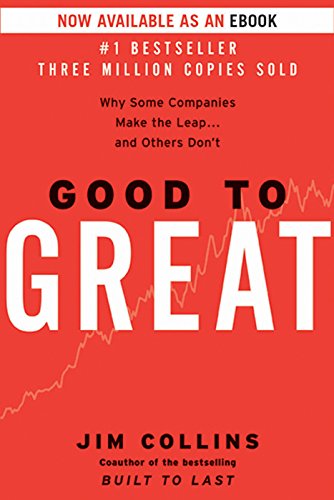

This article is an excerpt from the Shortform summary of "Good to Great" by Jim Collins. Shortform has the world's best summaries of books you should be reading.
Like this article? Sign up for a free trial here .
What are the qualities of a good business? How do you turn a good business into a great business?
We’ll cover six qualities of a good business, from Jim Collins’s classic Good to Great. Learn how to make your good business a great one.
Qualities of a Good Business
Below are the six most important qualities of a good business:
Quality #1 of a Good Business: It Cultivates Singular Leadership
The first quality of a good business is strong leadership. Good-to-great companies have what Collins et al. call “Level 5” leaders. Level 5 leaders are personally humble, almost shy, but highly driven professionally—more like Lincoln than Patton.
They avoid the limelight and tend to credit exterior forces or colleagues for their companies’ successes. Although they’re often personally likable and inspiring, they’re not usually “charismatic.”
Their lack of ego enables them to concentrate on one thing and one thing only: the company’s success.
How to achieve it: Collins admits that Level 5 characteristics are likely a product of both nature and nurture and so are difficult to create out of whole cloth; he also doesn’t have hard data to back up any suggestions he might make. His best advice for aspiring Level 5 leaders is to follow the other precepts he outlines. That way, even if you aren’t a Level 5 leader, you’ll at least be acting like one.
Quality #2 of a Good Business: It Assembles the Right Team
The second quality of a good business is the right team. Good-to-great companies retain the right people before embarking on any specific program.
A good-to-great team is composed of people who care deeply about the company and will argue passionately for the decisions they believe are right (but will come together to support whatever decision is eventually reached).
Avoid at all costs the “genius with a thousand helpers” model; management teams should be composed of independent and critical thinkers, not “yes people.”
How to achieve it: (1) Don’t hire until you’re sure you have the right person; (2) recognize when you need to make a change (whether by shifting a role or letting someone go) and act swiftly; and (3) assign your best people to your biggest opportunities rather than your biggest problems.
Quality #3 of a Good Business: It Unearths and Faces Facts
The third quality of a good business is that it faces the facts. Good-to-great companies are evangelical about recognizing market realities and reacting in kind.
That said, no matter how dire the facts, they never lose faith that, eventually, they’ll prevail.
The key is to be stoic yet hopeful, realistic without turning cynical.
How to achieve it: With the right management team—one comprising sharp, critical thinkers—the facts should never be in short supply. Leaders can encourage truth-telling by: (1) Beginning meetings with questions, not answers; (2) cultivating, rather than stifling, debate among the team; and (3) conducting clear-eyed analyses of mistakes without assignation of blame.
Quality #4 of a Good Business: It Thinks Like a Hedgehog
The fourth quality of a good business is that it thinks in a simple, singular way. “Foxes” know many things and see the world in all its complexity, whereas “Hedgehogs” know one big thing and order the world according to that thing.
A good-to-great company thinks like a hedgehog by developing a “Hedgehog Concept”—an elegant, easy-to-understand guiding philosophy based on facts—that it adheres to fanatically.
How to achieve it: A company’s “Hedgehog Concept” is derived from the answer(s) to three questions: (1) At what can I be the best in the world? (2) What is my financial engine? And (3) What am I profoundly passionate about?
Quality #5 of a Good Business: It Maintains Discipline
The fifth quality of a good business is that it’s disciplined. Good-to-great companies make the jump because they constantly refer to and consistently realize their Hedgehog Concepts. Rigorous adherence to a Hedgehog Concept saves companies from panic acquisitions or misguided projects.
Good-to-great companies also lack the administrative and managerial burdens of other companies—with the right people in place and an easy-to-understand Hedgehog Concept, the need for tight management or layers of bureaucracy withers away. Discipline does not mean a tyranny presided over by the executive.
How to achieve it: (1) Allow individuals freedom within a clear framework of responsibility; (2) retain self-disciplined people who are driven to produce results; (3) recognize that a disciplined culture is different from a culture led by a tyrant or disciplinarian; and (4) adhere fanatically to hedgehog thinking. A key technique for staying true to your Hedgehog Concept? Create a “stop doing” list.
Quality #6 of a Good Business: It Uses Technology Tactically
The sixth quality of a good business is that it adopts technology slowly. For good-to-great companies, technology isn’t the creator of great results but their accelerant.
Rather than follow technological fads and adopt new technology for its own sake, good-to-great companies pioneer particular uses of new technology.
How to achieve it: When evaluating a new technology, the key question to ask is: How does this technology impact my Hedgehog Concept? If it doesn’t, you can safely ignore it and/or accept parity in its use; if it does, you must figure out how you can lead in the application of that technology.
———End of Preview———

Like what you just read? Read the rest of the world's best summary of "Good to Great" at Shortform . Learn the book's critical concepts in 20 minutes or less .
Here's what you'll find in our full Good to Great summary :
- The 3 key attributes of Great companies
- Why it's better to focus on your one core strength than get spread thin
- How to build a virtuous cycle, or flywheel effect, in your business






